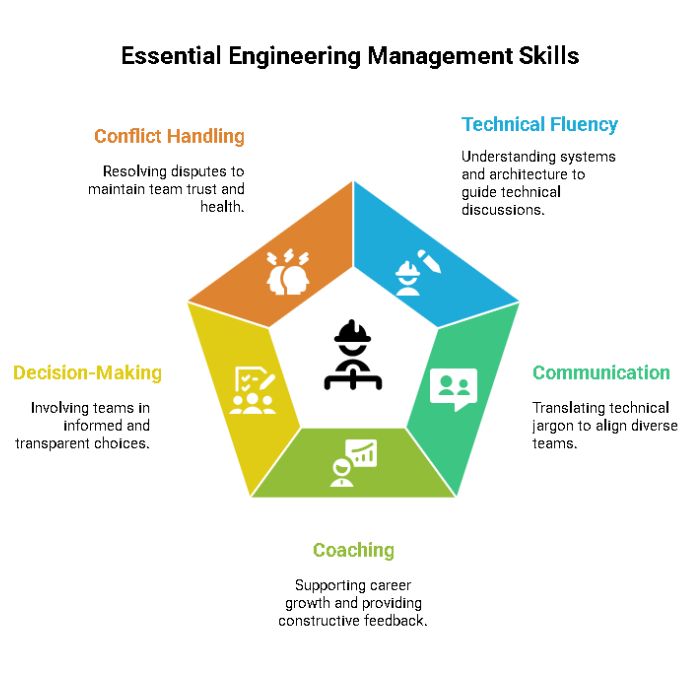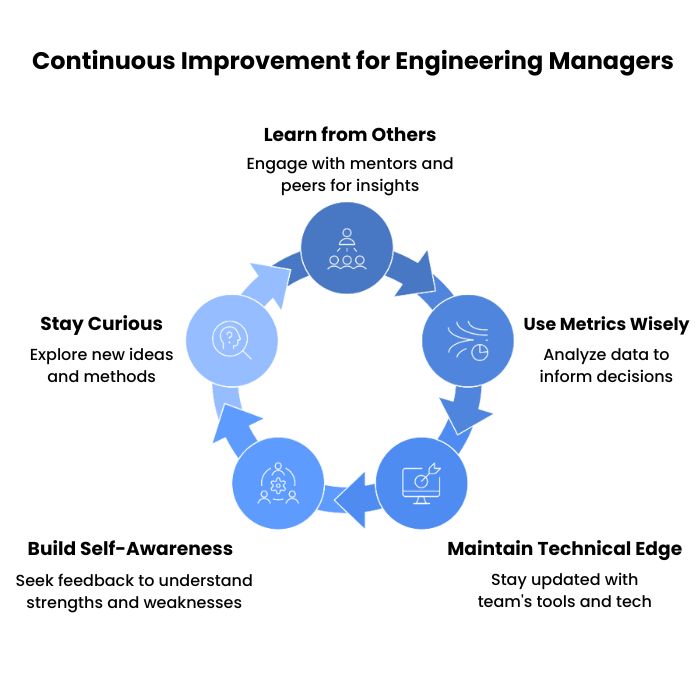A good engineering manager doesn’t just manage tasks — they shape how a team works, grows, and delivers. They bridge the gap between technical work and business goals, guiding engineers while keeping projects on track.
As companies scale, the demand for strong engineering managers rises. But what makes someone great at this role? It’s more than knowing code or running meetings. It’s about how they lead, support, and make decisions that bring out the best in their teams.
In this guide, we’ll break down the traits, skills, and everyday practices that separate good managers from average ones. Whether you’re stepping into your first leadership role or looking to level up, this article will show you what matters — and how to build it into your work.
What Does an Engineering Manager Do?
An engineering manager (EM) is responsible for making the team productive, stable, and aligned with company goals. Their job isn’t just about writing code, or like a senior developer who focuses on deep technical work, or a tech lead who drives architecture decisions. let’s know what an engineer does-
Key Responsibilities of an Engineering Manager
- Team Management and Mentorship
EMs hire, coach, and support engineers. They give feedback, run one-on-ones, help with career growth, and make sure the team stays motivated and balanced. - Project Planning and Execution
They turn high-level goals into realistic plans, set timelines, unblock the team, and keep projects moving without burning people out. - Cross-Functional Communication
EMs act as the bridge between engineering, product, design, and leadership. They explain priorities clearly and make sure everyone is aligned. - Technical Decision-Making (Not Always Hands-On)
While not always coding, EMs need enough technical depth to guide discussions, spot red flags, and back their engineers when it counts.
Where They Fit in the Organization
Engineering managers typically report to a director or VP of engineering and work closely with product managers. In small teams, they might wear multiple hats. In larger orgs, they lead pods or verticals focused on specific features, systems, or services.
Their main job? Build a team that ships quality work — and enjoys doing it.
Core Traits That Make a Great Engineering Manager
Great engineering managers aren’t defined by their title — they’re known by how their teams work and grow under their leadership. These five traits consistently show up in managers who make a real impact.
1. Leads by Influence, Not Control
Strong leaders guide teams without micromanaging. They trust their engineers, delegate clearly, and give people space to own their work. Instead of watching over shoulders, they set expectations, remove blockers, and stay available when needed.
Autonomy builds confidence. Great EMs know that a team that feels trusted will perform better — and stay longer.
2. Emotional Awareness and Empathy
Every engineer brings different strengths, goals, and stressors. A good manager notices those things and adjusts accordingly. They check in regularly, listen without judgment, and respond with understanding — not just process.
When conflict happens, they don’t avoid it. They address it early, calmly, and fairly. This keeps tension low and trust high.
3. Ownership Without Blame
The best EMs own the outcome — good or bad. If the team misses a deadline, they don’t point fingers. They reflect, regroup, and guide the team forward.
At the same time, they don’t disappear when things go well. They shine a light on the team’s wins, giving credit where it’s due. That’s how they lead from the front — and the middle.
4. Clear Thinking in Tough Moments
Engineering work is full of pressure: bugs before launch, last-minute changes, shifting priorities. A great EM doesn’t panic. They slow down, assess quickly, and decide what matters most.
Sometimes that means acting fast. Sometimes it means pausing to ask the right questions. They know the difference — and it shows.
5. Long-Term Mindset, Even in Short-Term Chaos
Good EMs don’t chase quick wins that hurt the team later. They think in quarters, not just sprints. Whether it’s hiring decisions, tech debt trade-offs, or career growth, they balance now with next.
They keep one eye on delivery — and the other on team health, scaling challenges, and what’s coming around the corner.
Key Technical and People Skills Required
Being a great engineering manager means balancing people and tech. You don’t need to be the best coder in the room — but you do need enough skill to lead confidently, ask the right questions, and help your team grow.

1. Technical Fluency (Not Just Hands-On Coding)
You don’t have to code full-time, but you must understand how systems fit together. Architecture, scaling, and trade-offs should make sense to you — not sound like a foreign language.
You should be able to review code, spot red flags in design, and guide technical conversations. Staying current with tools and trends helps you lead with context, not guesswork.
2. Communication That Connects Across Teams
Engineers, product managers, and execs all speak different languages. Your job is to translate between them. That means simplifying without dumbing down, and explaining the “why,” not just the “what.”
Clear communication helps align priorities, avoid confusion, and build trust across the company.
3. Coaching That Builds Careers, Not Just Code
Great EMs make others better. You support junior devs as they level up, and help seniors grow into leaders. You ask good questions, give honest feedback, and make growth feel achievable — not stressful.
Career paths shouldn’t be a mystery. You help people see where they’re going and what steps come next.
4. Decision-Making with Team Input
You’re expected to make calls — but not in a vacuum. The best EMs involve their team, weigh trade-offs, and explain why a decision was made. That way, even if someone disagrees, they understand the reasoning.
Good decisions come from clarity, context, and shared ownership.
5. Conflict Handling That Builds Trust
Even the best teams hit friction. Strong managers step in early, stay neutral, and guide resolution without taking sides. They separate the issue from the person and help people move forward.
Avoiding problems doesn’t keep a team healthy — facing them directly does.
Best Practices: Great Engineering Managers Follow
The best engineering managers aren’t reactive — they lead with intent. These practices help build teams that move fast, grow steadily, and stay aligned with the bigger picture.
1. Set Clear Goals and Roadmaps
Great EMs work closely with product managers to shape plans that the team understands and believes in. They help break work into manageable chunks, prioritize what matters, and set timelines that make sense — not just look good on slides.
When goals are clear, decisions become easier, and momentum builds naturally.
2. Build a Healthy, High-Performing Culture
A team won’t perform well if it doesn’t feel safe to speak up, experiment, or fail. Strong managers create an environment where people can ask questions, raise concerns, and admit mistakes without fear.
They reward learning, celebrate progress, and make space for curiosity — not just delivery.
3. Balance Tech Debt, Delivery, and Innovation
Shipping fast is great — but not at the cost of long-term pain. Great EMs protect time for cleanup, refactoring, and scaling work that doesn’t show up on a product roadmap.
At the same time, they encourage trying new tools, methods, or ideas. The balance? Keep today running while building for tomorrow.
4. Hire Thoughtfully and Build Real Teams
Good hiring isn’t just about skills — it’s about fit, balance, and potential. Great EMs look for people who bring fresh strengths and complement the current team.
They also invest in onboarding and team rituals. Because hiring the right people is only half the job — helping them thrive is the rest.
5. Stay Visible Without Hovering
Strong managers don’t disappear, but they don’t hover either. They check in often, stay available, and offer guidance without micromanaging.
Whether it’s sprint planning, one-on-ones, or a hallway chat, their presence feels like support — not pressure.
Common Mistakes That Even Experienced Engineering Managers Make
Even skilled managers slip up. The key is knowing which habits quietly hurt teams — and how to correct them before they grow into bigger problems.
1. Getting Too Hands-On or Too Distant
Some EMs try to stay too technical, jumping into code daily. Others pull back too far, losing track of what the team is building. The right balance? Stay aware, stay involved — but don’t be the bottleneck.
Know when to step in and when to trust your team to figure things out.
2. Prioritizing Process Over People
A smooth process helps, but it shouldn’t come at the cost of trust and flexibility. Overloading teams with meetings, strict templates, or heavy frameworks can kill creativity and morale.
Good structure supports the team. It doesn’t control them.
3. Skipping One-on-Ones or Treating Them Like Status Updates
One-on-ones aren’t just check-ins — they’re where real growth and connection happen. Great managers use them to listen, coach, and build trust.
Treating them as a formality or pushing them off sends the wrong message.
4. Giving Feedback Too Late or Too Lightly
Delaying tough conversations can turn small issues into big ones. Sugarcoating feedback might feel kind, but it leaves people guessing.
The best EMs are clear, direct, and timely. They speak with honesty — and care.
5. Ignoring Burnout Signs Until It’s Too Late
Burnout rarely shows up all at once. It’s quiet — lower energy, missed details, short tempers. Great EMs stay alert and check in before problems spiral.
Protecting team health isn’t extra work. It’s part of the job.
How to Continuously Improve as an Engineering Manager
Great EMs don’t settle. They treat growth like part of the job — because it is. Here’s how to keep improving without burning out or falling behind.

1. Learn from Mentors, Peers, and Real Conversations
You don’t need to figure it all out alone. Talk to other EMs, connect with senior leaders, and trade notes with peers.
Books and podcasts help, but real growth often comes from honest feedback and shared challenges.
2. Use Metrics — But Don’t Rely on Them Blindly
Velocity, bug counts, and retention rates can show useful trends — but they’re just signals. Look beyond the numbers.
Ask what they mean, and don’t manage people like data points. Context always matters.
3. Keep Your Technical Edge Sharp Enough
You don’t need to write code daily, but you should understand the tools your team uses.
Skim docs, ask questions, and stay close enough to tech choices that your input adds value — not confusion.
4. Build Self-Awareness Through Feedback Loops
Ask your team what’s working and what’s not. Simple questions like “What should I do more or less of?” open doors.
Be open to hard truths. Growth starts when defensiveness ends.
5. Stay Curious, Even When You’re Busy
Whether it’s learning a new leadership style or trying a better 1:1 format, curiosity keeps you improving.
The best EMs adapt — not because they’re told to, but because they care about doing better every week.
Conclusion
Becoming a great engineering manager isn’t about checking boxes — it’s about consistently showing up in ways that make your team stronger, more focused, and more confident. The job is rarely perfect and often uncomfortable, but that’s where the real growth happens.
You’ll face trade-offs that don’t have clean answers. You’ll be the person others look to during change, tension, or doubt. And you won’t always get it right — but the best EMs learn fast, stay grounded, and keep showing up with clarity and care.
If you’re serious about leveling up, start small: listen more closely, ask better questions, and treat leadership as a craft, not just a title. Good teams don’t need perfect managers — they need ones who keep learning how to lead well.
That’s what makes the difference.




